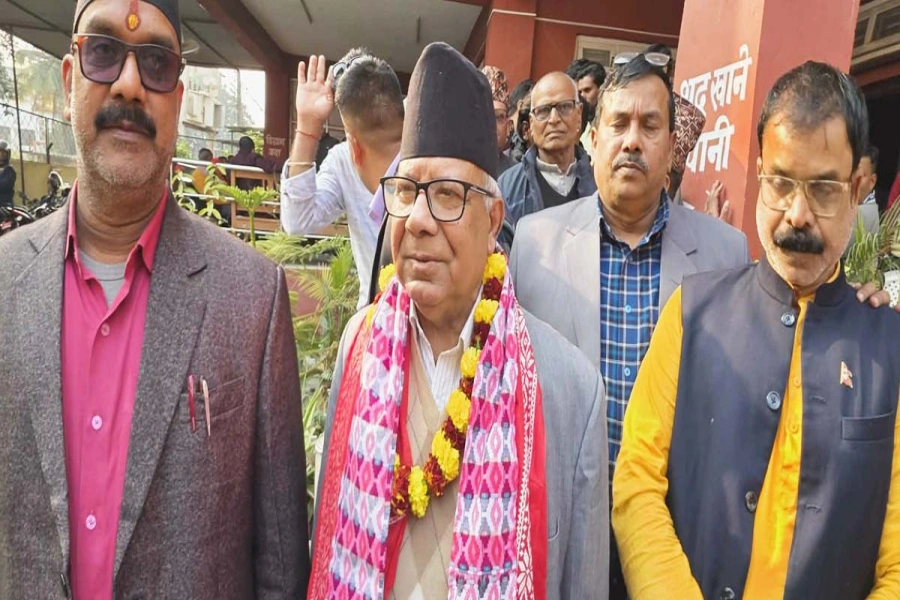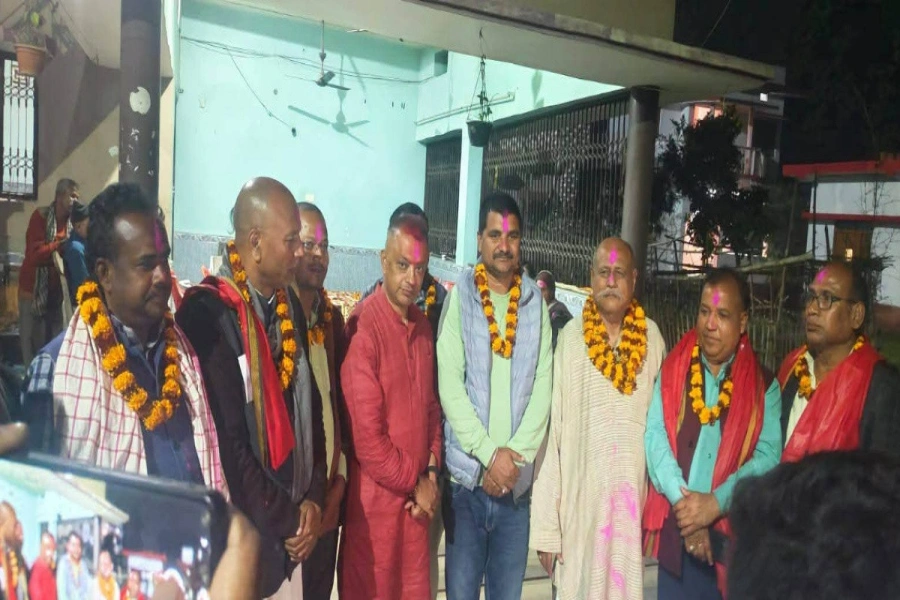As the UNMIN head, she visited New York early this month to defend the budget for UNMIN in the budget committee. In her interview to myrepublica.com, her first to the Nepali media, Landgren talks about the contemporary political situation and the discharge of minors from the Maoist cantonment sites, among other things. An adjunct professor at Columbia University´s School of International and Public Affairs, Landgren says the ruling Maoists will face the music from the international community unless they move quickly on the minors´ issue.
Excerpts:
myrepublica.com: Where does UNMIN stand at the moment vis-à-vis the peace process?
 Karin Landgren: The best overview of where things stand is probably Ian Martin´s last statement to the Security Council in January. It not only gives where things stand, but looks back at the beginning of the (peace) process. I was in New York at the beginning of the month (March) and the time I left here, there was a cause for concern because the recruitment issue had blown up again, Tarai was paralyzed by strikes.
Karin Landgren: The best overview of where things stand is probably Ian Martin´s last statement to the Security Council in January. It not only gives where things stand, but looks back at the beginning of the (peace) process. I was in New York at the beginning of the month (March) and the time I left here, there was a cause for concern because the recruitment issue had blown up again, Tarai was paralyzed by strikes.Now, a few weeks later, I feel cautiously more optimistic on the army integration front. The Army Integration Special Committee (AISC) is, I understand, meeting weekly, which is a very positive development. This week, it is supposed to establish the technical committee (which was officially formed on Friday). I think it will establish its secretariat as well and we have been given some positive messages on discharge of the disqualified combatants. It has been long overdue and the AISC should implement its earlier decision to release the minors as soon as possible. So, those are some of the specific issues of concern to UNMIN.
On the peace process overall, it is essential that the parties find a way of re-establishing the climate of trust and confidence that allows them to come to the peace agreement in the first place. And, that climate has been strained repeatedly over the last several months. One positive development is that the Prime Minister has, on a few occasions, convened seven party meetings to discuss issues of national concern – most recently, I believe, over the Tharu bandh. A platform that brings together the major parties seems to me critical for the peace process to move forward.
myrepublica.com: You said you were given positive indications regarding the discharge of disqualified Maoist combatants. The UN was assured by the PM during Radhika Coomaraswamy´s visit in December that the disqualified combatants would be discharged from cantonments by February-end. Nothing happened. What makes you think positively about the PM´s fresh commitment?
Landgren: I think this process can´t be delayed further. International reaction will be very, very strong. There is a coincidence of timing next month when the Secretary-General´s report on Nepal will be out almost about the same time with the Secretary General´s report on children and armed conflict, which will continue to list CPN-M (read Unified Communist Party of Nepal-Maoist) as a violator because they haven´t released the former child soldiers. I think it means there will be a great deal of attention during that period on those who haven´t been released, especially the former children (in the Maoist army). I raised this when I met the PM yesterday (March 24).
He (PM) is aware of the commitment he has made to release former child soldiers by the end of February. I am guardedly optimistic that plans are coming together. But, of course, I would like to be able to say more than that when I present the Secretary-General´s report to the Security Council in mid-April.
myrepublica.com: There is an argument floated by Maoist People´s Liberation Army (PLA) that those verified as minors by the UN are already adults now. And, they can continue in the PLA. What is your reaction to that?
Landgren: They are already adults because the Maoist army didn´t release them when they were supposed to release them. Having failed to release them on time is not a reason for not releasing them now. The obligation, both under the peace agreement and in international law, is to release them.
myrepublica.com: Given their past record that they haven´t lived up to their commitments, if the Maoists fail to release the minors by the time when the two reports of the Secretary-General are out next month, what will be the international reaction towards Maoists?
Landgren: It´s striking that in some meetings of the Security Council, every delegation has raised this issue. So, for sure, this issue will continue to be a major political irritant for the government if they don´t take steps quickly to release them.
myrepublica.com: On the army integration front, PM Dahal has said publicly that army integration process will be completed by July, when the current UNMIN mandate expires. How optimistic did he sound on this commitment during your meeting with him?
Landgren: He sounds very optimistic to me. I am encouraged by the fact that the members of the (special) committee will now meet every week. I am told they will meet every Monday.
myrepublica.com: Secretary-General gave a clear indication in his report to the Security Council in January that UNMIN´s mandate won´t be extended after July. Did the PM give any indication that the government would request for one more extension?
Landgren: We haven´t discussed UNMIN´s term at all. It seems very early at this stage to start looking at the mandate that will end after late-July.
myrepublica.com: You visited New York recently. How is the mood there with regards to Nepal?
Landgren: There is a tremendous interest in Nepal´s peace process. It is evidenced that after the election last year there was impatience for the next step to be completed. In January, there was greater understanding in the Security Council of the process. Talking to the Department of Political Affairs, at the beginning of this month, there is this feeling that it is moving slower than you would like, slower than the UN would like. The message is really to encourage the parties to step up on some of the peace process issues.

Bikash Karki
myrepublica.com: I have heard that the Security Council members stand ready to give one more extension for UNMIN in the event the army integration process is not completed by July and the government requests for a further extension. Do you see that happening?
Landgren: You are probably hearing more optimistic things than I am. The Security Council next month will be looking very hard to see positive developments in the peace process. Members of the Security Council have made clear that they don´t support UNMIN simply rolling over for more extension. We are under the microscope of the Security Council. It will be important to show that some of the peace process issues are making steady progress.
myrepublica.com: UNMIN reminded the government in 2006 and 2007, when the Nepal Army (NA) entered into recruitment drive, that any recruitment would go against the Comprehensive Peace Agreement (CPA) and Agreement on the Monitoring of Management of Arms and Armies (AMMAA). In December, UNMIN issued a public statement when the NA started fresh recruitment. Why was there no public statement from UNMIN when the PLA called for fresh applications?
Landgren: UNMIN´s position on recruitment has been the same, going back several years now. UNMIN raised this concern with the government every time, not necessarily through a public statement. Public statement came for the first time last December after NA recruitment drive had been met by a Maoist army threat to begin recruiting. So, it was really a response then to recruitment or potential recruitment by both sides. That statement in December pertains to both sides. That was even handed.
We are going to raise the recruitment issue whenever it comes up and I can tell you that we did it last time as well. But that doesn´t mean that we are going to make a public statement each time and particularly, now that the issue is in the Supreme Court, it is my preference not to make a public statement. Privately, we will continue to make clear what our position is.
myrepublica.com: Don´t you think CPA and AMMAA are a bit obsolete now, as political contexts have changed significantly since they were signed in 2006?
Langdren: It is a matter for the parties to work out. In January, there were some talks on a new 12-point agreement. I haven´t heard discussion on amending the CPA. I think the important thing is a platform for political discussions. A number of commitments are made and that have yet to be implemented. A monitoring body on those commitments and more regular dialogue among the key actors are the critical things in moving the process forward. Some people certainly have to look at whether the special committee is going with its tasks of supervising, integrating and rehabilitating the Maoist combatants. It´s going to mean a need for close cooperation at the JMCC (Joint Monitoring Coordination Committee), which also specifically monitors the implementation of AMMAA with both the NA and Maoist army. Clearly, there is going to be some overlap of coordination among those two bodies, something like that might need to be modified.
myrepublica.com: Is the JMCC meeting regularly?
Landgren: Very regularly. It has met just short of 100 times.
myrepublica.com: So, what is the environment like in the JMCC meeting when controversial issues like recruitment row are brought up?
Landgren: JMCC is one of the remarkable institutions of this peace process. It is something the UN itself can learn from what they call peace toolkit. I spoke to the staff college in the beginning of March. It has brought together NA and Maoist army. In the last three months, I think it has met 28 times, almost regularly, in a very positive atmosphere. Violations and allegations are brought up, and they are discussed and in most cases, there are agreements reached on whether it constitutes the violation or not. And, it moves on.
One of the valuable things about the JMCC is that it keeps the discussion on many issues in that room among the parties. And I hope, with the special committee as well, it brings together extreme rhetoric about the pros and cons of integration of some or all or none of the Maoist ex-combatants into the NA. Rhetoric has to come down and the special Committee is the place for that.
The atmosphere (in the JMCC) is very cooperative. Overall, that climate is maintained. No one has pulled out and said we are not going to be a part of it. I think it is an important role that UNMIN can play and will continue to play in bringing the parties together. It is their dialogue, really.
myrepublica.com: What is your independent view about the direction that Nepal´s politics is heading towards?
Landgren: As I post my six month mark here, I have to be guided by what I see looking back. When I look back, 2008 in particular, I know that there were many frustrations even among the people working in UNMIN. Elections were postponed. When we look back now, the achievements of 2008 were remarkable. Extraordinary political changes took place. So, I feel very optimistic about what can be done in 2009. The parties, the politicians, the civil society have shown what can happen in a relatively short period of time.
There are many outstanding issues from the peace process that need to be addressed: development, poverty, impunity and accountability and the inclusiveness in the public sector; if you go to Tarai, armed groups are operating there. But I don’t see a sign away from the need to address these issues. Everyone knows that they need to be addressed and I am confident that they will be addressed.

Bikash Karki
myrepublica.com: I know UNMIN is not given any role in the ongoing negotiations between the government and various armed groups? But, do you, as an observer, see it is headed for any kind of breakthrough, given that some groups engaged in the talks are frustrated?
Landgren: As you said, UNMIN is not involved in that issue and I can´t really comment. I can´t really be drawn on the issue of the armed groups. It is an issue that is crucial to the peace process as a whole. It is a very important issue. But, it is one we are not engaged in.
myrepublica.com: Is UNMIN downsizing the arms monitoring unit as well?
Landgren: UNMIN downsized very significantly in July last year before I came. There was further downsizing at the end of the last mandate in January. At that time, the level of the arms monitors was 73. The strength stood at 186 at one point.
myrepublica.com: Ian Martin used to raise the issue of poor conditions inside the Maoist cantonments. What about the condition in cantonments now?
Landgren: Condition in the cantonments is still quite rough. I am sure there is a significant improvement from the time they were set up. Conditions are very basic. I gather that, in Chitwan, there was drinking water problem for four days, which has been addressed. I wouldn´t describe it is anything other than rough condition.
myrepublica.com: Do you think some of the criticisms against UNMIN are politically motivated?
Landgren: I think the atmosphere is very cooperative towards UNMIN as of today. I hear a lot of appreciation for UNMIN´s support to Nepal´s peace process. What is important is that the access (to politicians for meetings) is excellent.
myrepublica.com: As compared to Ian Martin, you have remained a bit quiet, like not going to the media quite often. Is it a policy or a personal decision?
Landgren: I thought I should wait for six months. So, I have spent my first six months here before talking to the media. You have been my first interview. That´s the reason. Ian had the advantage of having spent four years here. When he left, I thought just how many leaders he had actually visited when they were in prisons. Six months seem to be minimum decent period before I start talking to the press.
tilak@myrepublica.com








































